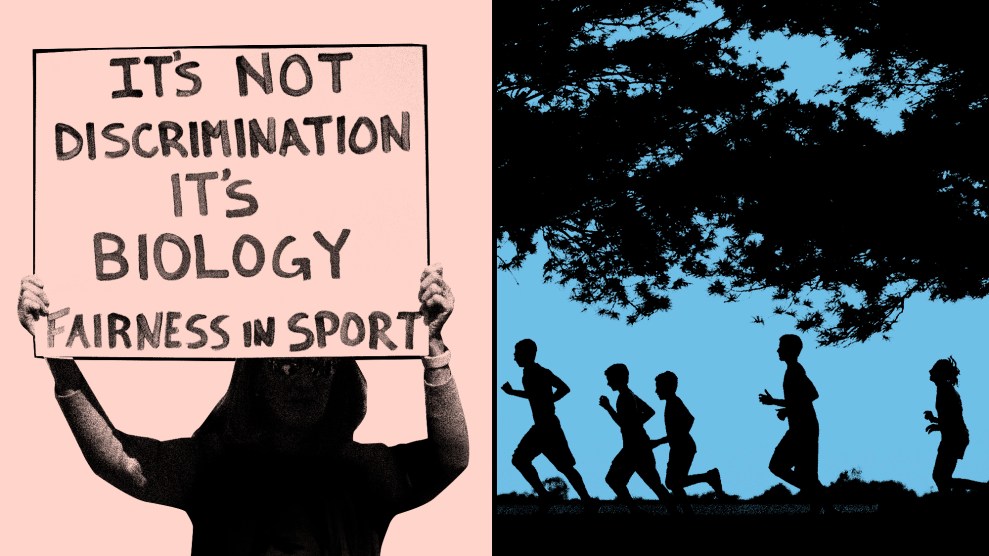
Children, parents and several Democratic lawmakers rally at the south steps of the Texas Capitol in April 2021, criticizing several anti-transgender bills winding their way through the 87th Legislature.Bob Daemmrich/ZUMA
Thursday was a whirlwind day for the trans community. First, the Supreme Court court declined to immediately reinstate a 2021 West Virginia law requiring female sports teams at public middle schools, high schools, and colleges be solely based on “biological sex” rather than gender identity.
The high court’s unsigned order means that the plaintiff who sued over the law, 12-year-old Becky Pepper-Jackson, can continue to participate on the girl’s cross country and track teams at her school as the U.S. Court of Appeals for the 4th Circuit reviews her case. More broadly, the order also meant that, as nearly two dozen states have enacted bans on trans student athletes in recent years, the Supreme Court considered such a ban for the first time—and sided in favor of the trans community.
But then, on the same day, the Biden administration announced a proposed rule change clarifying that schools receiving federal funding can ban transgender athletes from participating on sports teams that align with their gender identity while still complying with Title IX regulations, in some circumstances.
Some saw the Administration’s move as a necessary first step in confronting a wave of sweeping anti-trans sports bills, including the one in West Virginia, that were motivated by animosity towards trans kids. “We really applaud the Department of Education,” Rodrigo Heng-Lehtinen, the executive director of the National Center for Transgender Equality told Mother Jones.
Yet, others saw the proposed rule change as tacit approval that excluding trans children from sports is sometimes justified. “Absolutely no reason for the Biden admin to do this. It is indefensible and embarrassing,” Congresswoman Alexandria Ocasio-Cortez tweeted. “The admin can still walk this back, and they should. It’s a disgrace.”
On one hand, the rule change would disallow sweeping bans on trans student athletes by clarifying that exclusions must be “substantially related to the achievement of an important educational objective” such as “fairness in competition” or the “prevention of sports-related injury.” Thus, trans sports bans based solely on hostility towards trans people would not be allowed.
The guidance goes to great lengths to assert that bans affecting younger grades would generally not be permitted. “The Department currently believes that there would be few, if any, sex-related eligibility criteria applicable to students in elementary school that could comply with the proposed regulation, and that it would be particularly difficult for a recipient to comply with the proposed regulation by excluding students immediately following elementary school from participating on male or female teams consistent with their gender identity.”
By denying federal funding to schools that don’t comply with the proposed rule change, the guidance would effectively nullify, for example, the sweeping ban Kansas enacted last week, which bars all trans girls, including kindergarteners, from participating on single-sex sports teams matching their gender identity. Schools would also have to consider the nature of the sport itself in implementing bans. Under the guidance, it would be more difficult to justify excluding trans students from single-sex bowling or tennis teams compared to contact sports, such as soccer or wrestling.
But some LGBTQ-rights advocates worry that by openly stating bans are permissible in certain cases, the Biden administration is legitimizing the belief that trans student athletes pose substantial risks to other student athletes and is even providing a guidebook for places without trans sports bans to create restrictions that comply with the law. “It will give cover to states to impose bans in more creative ways that will be okay under this rule,” says Alejandra Caraballo, a Harvard Law School clinical instructor and trans-rights advocate.
A clear sign of the division came Monday, when 14 trans and nonbinary state legislators published a critical letter addressed to President Joe Biden, calling on his administration to revise the proposed language in a way that allows trans athletes to participate on the sports teams of their choosing. “While we understand the administration may have been attempting to provide legal protections & clarity, in actuality these proposed rule changes will simply provide those who seek to deny us our rights a roadmap for how to do so,” they wrote. “To put it plainly, there is no such thing as an acceptable ‘compromise’ that limits transgender Americans access to equal rights.” Notably, at least two openly trans state legislators, Virginia State Delegate Danica Roem, and Delaware State Senator Sarah McBride, did not sign the letter. (Biden wrote the foreword to McBride’s book, Tomorrow Will Be Different.)
Today 14 trans & nonbinary legislators expressed our concern to President Biden regarding the proposed Title IX policy change.
Trans people belong in sports. Policies must begin with the presumption of full inclusion & provide a pathway for participation in all levels of sports. pic.twitter.com/pxlDNHihKD
— Rep. Zooey Zephyr (@ZoAndBehold) April 10, 2023
Bans against trans people have skyrocketed in recent years. In 2015, 19 anti-trans bills—including ones related to sports participation and bathroom usage—were introduced across the country, according to Trans Legislation Tracker, a website documenting anti-trans bills in the US created by Andrew Bales. In the first few months of 2023, more than 490 bills have been introduced.
Bales fears this guidance reinforces the idea that such legislation is sometimes justified, despite there being limited scientific evidence that trans women have athletic advantages over cisgender women, especially at the elite level. “We’re in the midst of an escalating attack on trans people. It’s a moment where the Biden administration could clearly state that trans women are women, that they are protected against discrimination under Title IX,” says Bales. “Instead, this proposed rule change legitimizes the same anti-trans narratives underpinning sports bans we’ve tracked across the country for years.”
Heng-Lehtinen has a different read of the proposal. “It’s the federal government declaring affirmatively that a categorical ban against trans youth participating in sports is wrong, that a sweeping ban against transgender students is inappropriate,” he says, though he acknowledges that the proposed rule change is too vague in defining when sports bans would be permitted. “There are parts that still remain unclear in the Department of Education proposal, and in an environment where trans people are under attack, any room for ambiguity can be weaponized by bad actors.”
It’s why his organization, National Center for Transgender Equality, and Lambda Legal, a civil rights organization that advocates for lesbian, gay, bisexual, and transgender communities, say they will suggest modifications to make the proposed rule change more specific and reduce the odds of anti-trans groups exploiting it. “If I were counsel for a school district, I wouldn’t take the chance” in excluding trans athletes, says Sasha Buchert, the director of the non-binary and transgender project at Lambda Legal. “They would have to justify their discrimination.” Still, Buchert says, “I would have preferred something a lot stronger.”
Neither group, though, identified exactly what they would change about the proposed rule’s language to make it more specific, and thus harder to exploit. Rules adopted by professional sports leagues are an imperfect model: The national governing body for competitive swimming in the United States, for example, requires trans women meet low blood-testosterone levels in order to be eligible to compete. Similarly, the Department of Education suggests in its proposal that schools could use “physical examinations or medical testing” as criteria to exclude trans athletes. But in several states, minors are legally barred from gender-affirming care, including hormone therapy, meaning testosterone requirements may be impossible for some trans students to meet.
Since schools would have to justify their bans, the proposed rule change would likely protect Pepper-Jackson from exclusion if her school restricted trans participation—but some critics of the proposal say such protection may come at a cost.
Anti-trans leaders often point to trans sports participation as a lightning rod for their greater cause: characterizing transgender people as dangerous, and acceptance of their existence as antithetical to biology. The proposed rule change merely brings more oxygen to the issue. “What makes this issue of trans sports different, and so explosive politically,” Terry Schilling, the president of the conservative American Principles Project, said in 2022, “is because politicians are willing to talk about it.”


















